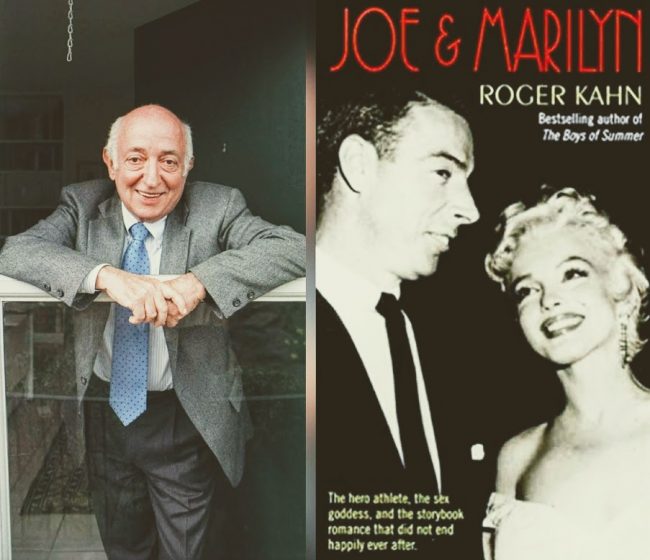
Roger Kahn, considered America’s greatest baseball writer, has died aged 92, the Los Angeles Times reports. His most famous book was The Boys of Summer (1972), in which he recalled his early days as a Dodgers fan. He also published Joe and Marilyn: A Memory of Love in 1986. The first stand-alone book on the explosive DiMaggio romance, it was a bestseller – although his portrayal of Marilyn was considered sleazy by some readers and critics, and her renewed friendship with Joe in her final years is omitted entirely.
“The problem with Joe & Marilyn is basically a problem with Joe and a problem with Marilyn. She slipped away, leaving friends who still protect her and others who gossip about her, and he has declined to speak from his heart.
As a young reporter, Mr. Kahn had an entire clubhouse of athletes, sitting in front of their lockers, day after day, telling their stories. In this book, subtitled ‘A Memory of Love,’ Mr. Kahn had to rely too often on second-hand stuff – the cottage industry of books about Miss Monroe as well as ‘people in DiMaggio’s close circle’ and ‘persistent reports’ and ‘stories’ and ‘legends.’
Roger Kahn did meet her once, at an impressionable age, during a publicity party for one of her movies. When he mumbled something about having covered the Yankees for a newspaper, she looked right through him, he recounts. That brief encounter inspired Mr. Kahn to describe her frequently as a sexually compelling woman, ‘that phenomenon of innocence and lust, blond hair and parted lips, the squirming nude on the calendar who aspired to play a Dostoevski heroine.’
He traces her path through the seamy casting calls, repeating the gossip that Marilyn did this or that for certain Hollywood figures, and repeating the saucy lines that Marilyn may or may not have said … Mr. Kahn also finds an ‘attractive, dark-haired New York lady who had dated Joe’ to tell this story: ‘Before we went out, mutual friends gave me a little list of things I was never to bring up. Marilyn, of course. Sinatra. The Kennedys. Johnny Carson.’
Toward the end, Mr. Kahn writes: ‘What went so wrong so quickly? He was neat. She was sloppy. He was repressed. She was hyperactive. Each was willful. Each had a temper. Each was a star. Stars in collision.’At another point, Mr. Kahn defines the problem in rather turgid prose: ‘Exactly what happened to the abandoned child called Norma Jeane in the casual way stations where she had to live carries us onto the turf of novelists.’ The critic and observer in Mr. Kahn may sense that it is time to leave Miss Monroe and Mr. DiMaggio to the novelists and the poets.”
George Vecsey, New York Times, November 24, 1986